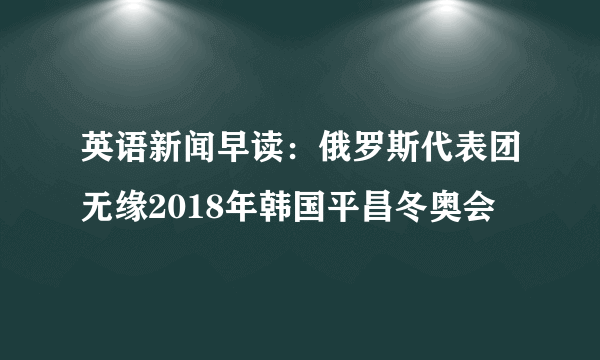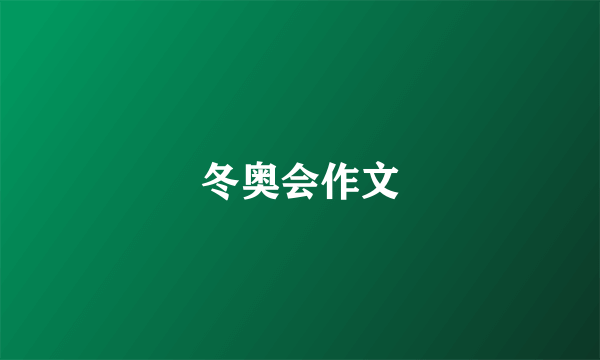
一席 - 英语新闻早读
12月5日,国际奥委会执委会委员在会上听取国际奥委会主席巴赫(中)的发言。
(图片来自网络)
▼
♬ 主播: Mia老师
♬ 新闻 :俄罗斯代表团无缘2018年平昌冬奥会
♬ 音乐:Incredible - Celine Dion
Russia has been banned from next year's Winter Olympics.
— NPR NEWS
俄罗斯被禁止参加2018年冬奥会。
听 力 测 试
- 请听新闻报道并回答下面的问题 -
- 可以在留言栏留下你的答案 -
1.(True or False)The IOC has stripped many of the medals won by Russian athletes in the Sochi Olympics.
2. What are the main steps that the IOC is taking against Russia?
- 答案见文末 -
新 闻 文 本
▼
▲ 上下滑动查看
I'm Alice Bryant.
Russia has been banned from next year's Winter Olympics. The International Olympic Committee made the decision because of what it calls the systematic manipulation of Russia's anti-doping system. Russia hosted the Winter Olympics in Sochi three years ago. Its athletes also won most of the medals. Many of those medals have now been taken away. NPR's Tom Goldman has been following all this, and he's with us now.
Hey, Tom.
TOM GOLDMAN, BYLINE: Hi. How are you?
MCEVERS: Hey. So what are the main steps that the IOC is taking against Russia here?
GOLDMAN: Well, as — the IOC has banned the Russian Olympic Committee. That's the formal wording. But basically, as you said, it means Russia as a whole is out. Now, very important — individual Russian athletes will be allowed to compete under strict conditions, meaning they have to prove they're clean. And if they pass rigorous drug testing, they'll be allowed to compete wearing a uniform that says OAR, Olympic athlete from Russia. And they'll compete under the Olympic flag. If they win, at the medal ceremony, they'll play the Olympic anthem.
Also, high-ranking Russian Olympic officials have been banned from South Korea and any future Olympic Games, and this includes an alleged key player in this saga, VitalyMutko. He's a former minister of sport and now deputy prime minister. And he was allegedly deeply involved in the state-sponsored doping scheme. Mutko's interesting because he's also the head of next summer's soccer World Cup in Russia, so he's a figure who will reappear even after the Winter Olympics are long gone.
MCEVERS: So that's how it affects the people involved. I mean, how big of a decision is this across the system by the IOC?
GOLDMAN: You know, we're hearing a lot of people say this is unprecedented, a huge moment for the IOC. But Kelly, you have to put this in context. Compared to what critics call foot dragging on this issue by the IOC, one person I spoke to, Olympic historian Jules Boykoff, called the IOC's handling of the Russian doping scandal an epic fail considering that, yes, by comparison, what happened today is significant and strong action.
MCEVERS: And Russian leaders, we should say, have all along denied that there was any widespread state-sponsored system of doping. What are they saying today?
GOLDMAN: Well, first it's being reported that Russian athletes will appeal the IOC ban at the Court of Arbitration for Sport. Excuse me. Some of the reaction — Russian Bobsled Federation president Alexander Zubkov, who was stripped last month of two gold medals he won at the Sochi games in 2014 — he said, I am simply shocked by what is happening. The president of the Russian Skating Union says the IOC decision is offensive and insulting. And Interfax news agency is reporting that Russian state television won't broadcast the Pyeongchang Olympics.
Now, at today's IOC meeting to decide the sanctions, the Russian Olympic Committee president apologized, but IOC officials wouldn't give further details. So we don't know if he apologized for state-sponsored doping or the fact that Russia got caught.
MCEVERS: And there had been some talk of a possible Russian boycott — right? — I mean, based on what the IOC decided.
GOLDMAN: Yeah.
MCEVERS: If they did that, what impact would it have on the games in South Korea in February?
GOLDMAN: It would have a major impact. Already ticket sales reportedly are lagging. Frankly people are wondering if they want to travel to the Korean Peninsula right now with all that's going on. And if Russia pulled out, it would have a major impact. These are the Winter Olympics, already a smaller event than the summer games. And missing a huge power player like Russia, which almost always dominates the medal count — that would really leave the games depleted.
MCEVERS: NPR's Tom Goldman, thanks a lot.
GOLDMAN: You're welcome, Kelly.
▼
- 听力测试参考答案 -
1. True
Russia hosted the Winter Olympics in Sochi three years ago.Its athletes also won most of the medals. Many of those medals have now been taken away.
2. Russia as a whole has been banned from the next year’s Winter Olympics but individual Russian athletes will be allowed to compete under strict conditions. Also, high-ranking Russian Olympic officials have been banned from South Korea and any future Olympic Games.
一 席 英 语
▼



